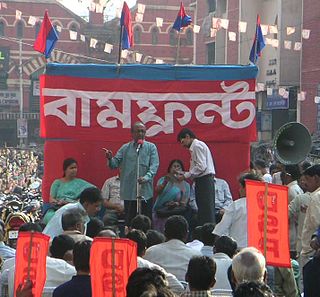Related Research Articles

Janata Dal (United) ("People’s Party (United)"), abbreviated as JD(U), is an Indian political party with political presence mainly in eastern and north-eastern India. JD(U) is recognised as a state party in the states of Bihar, Arunachal Pradesh and Manipur and is a part of government in Bihar. JD(U) heads the government in Bihar and has remained the second largest party in Manipur. JD(U) won 16 seats in the 2019 Indian general election, making it the seventh largest party in the Lok Sabha.

General elections were held in India in five phases between 16 April 2009 and 13 May 2009 to elect the members of the 15th Lok Sabha. With an electorate of 716 million, it was the largest democratic election in the world until being surpassed by the 2014 general election.
Communism in India has existed as a social or political ideology as well as a political movement since at least as early as the 1920s. In its early years, communist ideology was harshly suppressed through legal prohibitions and criminal prosecutions. Eventually, communist parties became ensconced in national party politics, sprouting several political offshoots.
The Republican Left Democratic Front (RiDaLoS) was a coalition of political parties in the Indian state of Maharashtra formed before the 2009 Maharashtra state assembly elections, in Maharashtra. The alliance was forged between 14 political parties and many other NGOs and non political groups as well as students organisations in Maharashtra Republican Left Democratic Front Popularly known as RIDALOS as an alternative to the existing coalitions in the state.
Third Front in Indian politics refers to various alliances formed by smaller parties at various points in time since 1989 to offer a third option to Indian voters, challenging the Indian National Congress (INC) and Bharatiya Janata Party (BJP).
Chungkhokai Doungel is an Indian politician. Doungel is a prominent Kuki leader, and has served as Minister in different coalition government in the state of Manipur.

The Legislative Assembly election was held over five-phases in Bihar through October–November 2015 before the end of the tenure of the prior Legislative Assembly of Bihar on 29 November 2015.

A Legislative Assembly election was held in 2016 for the 294 seats of the Vidhan Sabha in the state of West Bengal in India. The All India Trinamool Congress under Mamata Banerjee won 211 seats, and thus was reelected with an enhanced majority. Like in the 2011 election, the poll was held in six phases, with the first phase divided into two days. The first phase was held in Naxalite-Maoist affected Red corridor areas with two polling dates: 4 April and 11 April. The other phases were held on 17, 21, 25, 30 April and 5 May. The result of the election was declared on 19 May.

Mahagathbandhan (MGB), also known as Grand Alliance, is a coalition of political parties in the Eastern state of Bihar in India, formed ahead of the 2015 Vidhan Sabha elections in Bihar. The alliance consists of Rashtriya Janata Dal, Janata Dal (United), Indian National Congress and Left parties including Communist Party of India, Communist Party of India (Marxist–Leninist) Liberation and Communist Party of India (Marxist) with Nitish Kumar as the leader and Tejashwi Yadav as the chairperson. It is the ruling coalition government in Bihar.

The Left Front is an alliance of left-wing political parties in the Indian state of West Bengal. It was formed in January 1977, the founding parties being the Communist Party of India (Marxist), All India Forward Bloc, the Revolutionary Socialist Party, the Marxist Forward Bloc, the Revolutionary Communist Party of India and the Biplabi Bangla Congress. Other parties joined in later years, most notably the Communist Party of India.
The Left Front is a political alliance in the Indian state of Tripura. The Left Front governed Tripura 1978–1988, and again from 1993 to 2018. The Communist Party of India (Marxist) is the dominant party in the coalition. The other members of the Left Front are the Communist Party of India, the Revolutionary Socialist Party, and the All India Forward Bloc.
Different political parties in Manipur state of India are:
A number of political parties operate in the Indian state of Jharkhand. Some of them are organised nationally, and others within the region.
The following is a list of political parties in the Indian state of Tripura, on the national, state and regional levels.
The Left and Democratic Front was a pre-poll alliance of political parties in the Indian state of Manipur, which was formed ahead of the 2017 Manipur Legislative Assembly election.
The Secular Progressive Front was a political alliance in Manipur, India, which formed before the 2002 Manipur Legislative Assembly election and ruled Manipur from 2002 until 2012, when the alliance was broken.
References
- 1 2 The Hindu. Fragmentation of LSA in Manipur enthuses BJP, Congress. 26 March 2014.
- 1 2 3 The Telegraph. Manipur alliance to lodge ‘rigging’ complaint. 28 April 2014.
- ↑ The Lamka Post . LSA in C Doungel&Dr M Nara-te gum ding. 24 March 2014.
- ↑ The Hindu. NCP to promote Doungel for Manipur’s reserved seat despite death threats. 26 March 2014.
- ↑ The Sangai Express. Lien Gangte, Lamlalmoi join race for Outer MP Archived 11 May 2014 at archive.today . 10 March 2014.
- ↑ The People's Chronicle. Seven political parties extends support to C Doungel. 24 March 2014.
- ↑ The Hindu. Manipur NCP will support Left-Secular candidate. 24 March 2014.
- ↑ Times of India. Left & Secular Alliance leaders get threat calls. 27 March 2014.
- ↑ The Northeast Today. Left and Secular Alliance to Election Commission Archived 2014-05-11 at archive.today . 9 May 2014.
- 1 2 Hueiyen Lanpao. LSA team in Delhi to prevail upon ECI for action against Cong Archived 9 December 2018 at the Wayback Machine